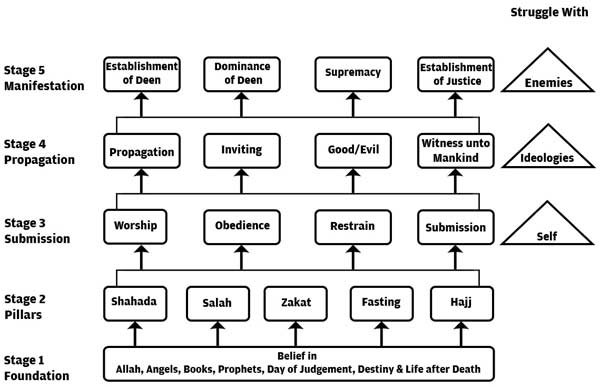A revolution is a fundamental change in political power or an organisational structure that takes place in a relatively short period of time when the population rises up in revolt against the current authorities. A revolution can be a complete change from one constitution to another or the modification of an existing constitution. Revolutions have occurred through human history and vary widely in terms of methods, duration, and motivating ideologies. Their results include major changes in culture, economy, and socio-political institutions.
Islam is a complete way of life and the Qur’ān is a book which guides mankind in every minor and major aspect of human life. The Qur’ān is a book which was revealed to take people from darkness to light. In order to bring people from a negative state to a positive state, a strong revolution is required. When we deeply ponder over the Qur’ān, we would realise that the Qur’ān also offers a beautiful theory of revolution which is spread over five levels. The stages are mentioned as follows:
FOUNDATION
The first stage is the stage of laying a strong foundation. It is based on six articles of faith such as, belief in Allah, belief in the Angels, belief in the Divine Books, belief in the Prophets, belief in the Day of Judgement and belief in Predestination. Of these, the first five are mentioned together in the Qur’ān. Where Allah says in the Qur’ān, “The Messenger has believed in what was revealed to him from his Lord, and (so have) the believers. All of them have believed in Allah and His angels and His books and His messengers, (saying), “We make no distinction between any of His messengers.” And they say, “We hear and we obey. (We seek) Your forgiveness, our Lord, and to You is the (final) destination.” (Qur’ān 2:285)
The sixth article is mentioned in two hadīths as follows. Prophet Muhammad (peace and blessings of Allah be to him) said, “Iman is that you believe in God and His Angels and His Books and His Messengers and the Hereafter and the good and evil fate (ordained by your God).” (Muslim) On another occasion, Ibn Abbas narrates that the Angel Jibrail once asked the Prophet, “Tell me what is Iman?” The Prophet replied, “Iman is to believe in Allah, the Day of Judgment, Angels, Books and Prophets and to believe in life after death; and to believe in Paradise and the Fire, and the setting up of the scales to weigh the deeds; and to believe in the Divine Decree, the good and the bad of it (all). Jibrail then asked him, “If I do all this will I be with Iman?” The Prophet said, ‘When you have done all of this, you will be having Iman.” (Musnad Ahmad)
PILLARS
The second stage is called the pillars stage. This stage basically has five aspects. They are as follows:
i. Shahadah: Allah says in the Qur’ān, “Say, He is Allah, (who is) One” (Qur’ān 112:1), where Shahadah is the first pillar.
ii. Salah: Allah says in the Qur’ān, “And establish Salah…” (Qur’ān 2:43), where Salah is the second pillar.
iii. Zakah: Allah says in the Qur’ān, “…And give Zakah…” (Qur’ān 2:43), where Zakat is the third pillar.
iv. Fasting: Allah says in the Qur’ān, “O you who believe, Fasting is prescribed to you: As it was prescribed to those before you that you may (learn) self-control” (Qur’ān 2:183), where Fasting is the fourth pillar.
v. Hajj: Allah says in the Qur’ān, “And complete the Hajj and Umrah for Allah” (Qur’ān 2:196), where Hajj is the fifth and final pillar of Islam. Thus, the five pillars of Islam are Shahadah, Salah, Zakat, Fasting and Hajj.
These are the five important aspects on which the other three stages will depend. That is the reason these five aspects are termed as the pillars of Islam. In order to effectively implement the next three stages, these five aspects have to be effectively implemented with steadfastness.
SUBMISSION
The third stage is called the ‘submission stage’. This stage basically has four aspects. They are as follows:
i. Worship (Ibadah): Allah says in the Qur’ān, “And I did not create the jinn and mankind except to worship Me” (Qur’ān 51:56).
ii. Obedience (Ita’at): Allah says in the Qur’ān, “And obey Allah and obey the Messenger and beware” (Qur’ān 5:92)
iii. Restrain (Taqwa): Allah says in the Qur’ān, “And fear Allah, in whom you are believers” (Qur’ān 5:88).
iv. Submission (Islam): Allah says in the Qur’ān, “O you who have believed, enter into Islam completely (and perfectly)” (Qur’ān 2:208).
This stage is a level where one has to strive and struggle against himself in order to implement it. One has to worship Allah, be obedient to him, fear Allah and submit to Him completely.
PROPAGATION
The fourth stage is called the ‘propagation’ stage. This stage basically has four aspects. They are as follows:
i. Propagation (Tableegh): Allah says in the Qur’ān, “And we are not responsible except for clear notification” (Qur’ān 36:17).
ii. Inviting (Dawat): Allah says in the Qur’ān, “Invite to the way of your Lord with wisdom and good instruction” (Qur’ān 16:125).
iii. Enjoining Good and Forbidding Evil (Amr bil Maaruf Nahi anil Munkar): Allah says in the Qur’ān, “You are the best nation produced (as an example) for mankind. You enjoin what is right and forbid what is wrong” (Qur’ān 3:110).
iv. Witness unto Mankind (Sahadat-e-Haq): Allah says in the Qur’ān, “And thus We have made you a median (i.e., just) community that you will be witnesses over the people.” (Qur’ān 2:143)
This stage is a level where one has to strive and struggle against the prevailing ideologies of his time. In this stage one has to propagate the ideology of Islam, invite people to Islam, call people toward good, forbid them from evil and to be a witness over the people.
MANIFESTATION
The fifth stage is called the ‘manifestation’ stage. This stage basically has four aspects. They are as follows:
i. Establishment of Deen (Iqamat-e-Deen): Allah says in the Qur’ān, “To establish the religion and not be divided therein.” (Qur’ān 42:13)
ii. Dominance of Deen (Izhar-e-Deen): Allah says in the Qur’ān, “The religion of truth to manifest it over all religion.” (Qur’ān 48:28)
iii. Supremacy (Ala-e-Kalimatullah): Allah says in the Qur’ān, “And brought utterly low the cause of those who were bent on denying the truth, whereas the cause of God remained supreme.” (Qur’ān 9:40)
iv. Establishment of Justice (Qiyam-e-Qist): Allah says in the Qur’ān, “O you who have believed, be persistently standing firm for Allah, witnesses in justice.” (Qur’ān 5:8)
This stage is a level where one has to strive and struggle against the enemies of Islam. In this stage one has to strive to establish the religion of Allah on earth, to work for the dominance of its ideology, to struggle for the supremacy of its religion and to establish justice on the face of the earth.
STRUGGLE
While the individual is in the third, fourth and the fifth stages, he needs to undergo a struggle at the respective levels. The following are the various types of struggle in different stages:
i. Third Stage – Self (Nafs): Allah says in the Qur’ān, “And strive for Allah with the striving due to Him” (Qur’ān 22:78).
ii. Fourth Stage – Ideologies: Allah says in the Qur’ān, “So do not obey the disbelievers, and strive against them with it (i.e., the Qur’ān) a great striving.” (Qur’ān 25:52)
iii. Fifth Stage – Enemies: Allah says in the Qur’ān, “And fight against the disbelievers collectively as they fight against you collectively. And know that Allah is with the righteous (who fear Him).” (Qur’ān 9:36)
If one has to move to the next stage then he needs to encounter with the respective struggles at each level. When the person is in the submission stage, he needs to struggle against his own self, when he is in the propagation stage, he needs to struggle against the false ideologies of their time. And when he is in the manifestation stage, he needs to struggle against the enemies who are not allowing to establish peace and justice on the face of the earth.
This theory gives a complete stage by stage concept as to how to bring in a constructive revolution. Any revolution cannot be accomplished within a day or two. For any revolution to be successful, it should happen stage by stage, with a lot of struggle at different levels. When the foundation is strong, achieving the ultimate goal of the revolution would be possible. Thus, the theory highly emphasises the need for making the foundation strong. Ultimately, if one wills to bring in a constructive revolution in any part of the world, they need to follow and undergo these five stages which are proposed in the theory.


